Unit 4 I used to be afraid of the dark说课课件
Unit 4 I used to be afraid of the dark.(讲义及作业)含答案

Unit 4 I used to be afraid of the dark. Words and Expressionshumorous /'hju:mərəs/ adj. 有幽默感的;滑稽有趣的silent /'saɪlənt/ adj.不说话的;沉默的helpful /'helpfl/ adj.有用的;有帮助的from time to time 时常;有时score /skɔ:(r)/ n.&v.得分;进球background /'bækgraʊnd/ n. 背景interview /'ɪntə(r)vju:/ v. 采访;面试n.面试;访谈Asian /'eɪʃn, 'eʒən/ adj.亚洲(人)的n.亚洲人deal /di:l/ v. (dealt /delt/, dealt) 对付;对待deal with 应对;处理shyness /'ʃaɪnəs/ n. 害羞;腼腆dare /deə/, /der/ v. 敢于;胆敢crowd /kraʊd/ n. 人群;观众ton /tʌn/ n. 吨;(pl.) 大量;许多private /'praɪvət/ adj. 私人的;私密的guard /gɑ:(r)d/ n. 警卫;看守v.守卫;保卫require /rɪ'kwaɪə(r)/ v. 需要;要求European /ˌjʊ(ə)rə'pi:ən/ adj. 欧洲(人)的n. 欧洲人African /'æfrɪkən/ adj. 非洲(人)的n. 非洲人British /'brɪtɪʃ/ adj.英国(人)的speech /spi:tʃ/ n. 讲话;发言public /'pʌblɪk/ n.民众adj. 公开的;公众的in public 公开地;在别人(尤指生人) 面前ant /ænt/ n. 蚂蚁insect /'ɪnsekt/ n. 昆虫seldom /'seldəm/ adv. 不常;很少influence /'ɪnfluəns/ v.&n.影响absent /'æbsənt/ adj.缺席;不在fail /feɪl/ v. 不及格;失败;未能(做到)examination /ɪgˌzæmɪ'neɪʃn/ n.考试;审查boarding /'bɔ:dɪŋ/ school 寄宿学校in person 亲身;亲自exactly /ɪg'zæktli/ adv. 确切地;精确地pride /praɪd/ n. 自豪;骄傲take pride in 为…感到自豪proud /praʊd/ adj. 自豪的;骄傲的be proud of 为…骄傲;感到自豪general /'dʒenrəl/ adj. 总的;普遍的;常规的n.将军introduction /ˌɪntrəˈdʌkʃn/ n. 介绍Paula /'pɔ:lə/ 葆拉(女名)Alfred /'ælfrɪd/ 艾尔弗雷德(男名)Billy /'bɪli/ 比利(男名)Candy /'kændi/ 坎迪(女名)Jerry /'dʒeri/ 杰里(男名);杰丽(女名) Emily /'emɪli/ 埃米莉(女名)Role-play the conversation.Alfred: This party is such a great idea!Gina: I agree. It’s been three years since we last saw our primary school classmates.Alfred: It’s interesting to see how people have changed.Gina: Billy has changed so much! He used to be so shy and quiet. Alfred: Yeah, his face always turned red when he talked to girls! Gina: I used to see him reading in the library every day.Alfred: That’s because he was a really good student. He studied hard and got good scores on his exams.Gina: Did he use to wear glasses?Alfred: Yes, and he used to be thin, too. But look how big andstrong he is now!Gina: He’s so popular now. Look at all the girls around him!Reading 1Read the article and identify the paragraphs in which thefollowing information appears. Number the information [1–3].____ how Candy’s li fe has changed____ Candy’s advice to young people____ Candy’s backgroundFrom Shy Girl to Pop Star1 For this month’s Young World magazine, I interviewed19-year-old Asian pop star Candy Wang. Candy told me that sheused to be really shy and took up singing to deal with hershyness. As she got better, she dared to sing in front of her class,and then for the whole school. Now she’s not shy anymore andloves singing in front of crowds.2 I asked Candy how life was different after she became famous.She explained that there are many good things, like being able totravel and meet new people all the time. “I didn’t use to bepopular in school, but now I get tons of attention everywhere Igo.” However, too much attention can also be a bad thing. “Ialways have to worry about how I appear to others, and I have tobe very careful about what I say or do. And I don’t have muchprivate time anymore. Hanging out with friends is almostimpossible for me now because there are always guards aroundme.”3 What does Candy have to say to all those young people whowant to become famous? “Well,” she begins slowly, “you haveto be prepared to give up your normal life. You can neverimagine how difficult the road to success is. Many times Ithought about giving up, but I fought on. You really require a lotof talent and hard work to succeed. Only a very small number ofpeople make it to the top.”3b Read the article again and complete the sentences about Candy.1.She used to be shy, but now she’s not shy ____________.2.She didn’t use to be ___________ in school, but now she getslots of attention.3.She used to ___________ with friends, but it is almostimpossible now.4.She didn’t use to ___________ how she appears to others, butnow she does.Grammar Focus重点句型:used to…过去常常……肯定句:I used to be short.否定句:I didn’t use to be popular in school.I usedn’t (used not) to be popular in school.疑问句:Did he use to wear glasses?—Yes, he did. / No, he didn’t.反意句:You used to be short, didn’t you?—Yes, I did. / No, I didn’t.Did she use to live in Shanghai?= Used she to live in Shanghai?Did you use to play the piano?= Used you to play the piano?—He used to drink milk, didn’t he?—Yes, he did.—No, he didn’t.—He used to drink milk, usedn’t he?—Yes, he did. / Yes, he used to.—No, he didn’t. / No, he usedn’t to.used to do sth. be used to (doing) sth. be used to do sth.She ______ live alone. But she ______ living alone because she feels lonely.A. used to; doesn’t used toB. is used to; was used toC. used to; is not used toD. was used to; doesn’t used to4a Write sentences about the past using used to.1.Grace / watch a lot of TV / watch a lot of moviesGrace used to watch a lot of TV. She didn’t use to watch a lot of movies.2.My mom / have curly hair / have straight hair____________________________________________________ __________________3.Jerry / read books on European history / read books on Africanculture____________________________________________________ __________________.4.Sandy / teach British English / teach American English____________________________________________________ __________________.Reading 2Read the passage and put the sentences [A-D] in the correctHe Studies Harder Than He Used toLi Wen is a normal 15-year-old boy from the countryside. He works very hard and does well in school. It is hard to believe that he used to have difficulties in school. When he was a little boy, he seldom caused any problems, and his family spent a lot of time together. ____________. His parents moved to the city to look for jobs, and his grandparents came to take care of him. But he missed his parents so much and he often felt lonely and unhappy.Li Wen’s unhappiness began to influence his schoolwork. He became less interested in studying. Sometimes he was absent from classes and he failed his examinations. Finally, Li Wen’s parents made the decision to send him to a boarding school. However, Li Wen was shy and was not able to make friends quickly in school. He found life there difficult. One day he told his teacher that he wanted to leave the school. _________ and she called his parents. She advised them to talk with their son in person. So his parents took a 24-hour train and a 5-hour bus ride to get to Li Wen’s school._____________. “It was exactly what I needed,” he said. “Now I understand that even though they are busy, they are always thinking of me. They take pride in everything good that I do.”After that, Li Wen’s parents hadmuch more communication withtheir son than they used to._____________. He becamemore outgoing and made somegood friends in school. He evenjoined the school basketball team and became active in many other activities. “I’m much happier now, and I work ever harder than I used to. I know my parents love me and they’re always proud of me,”says Li Wen. “It’s veryimportant for parents to be there for their children.”2e Complete the passage with the proper forms of the words and phrases in the box.Li Wen is a 15-year-old boy. He works hard and does well in school. It is hard to believe that he used to have difficulties in school. When his parents moved to the city to work, they could not be at home to _____________ him. So he became less interested in studying and _____________ classes. Then his parents ___________ to send him to a boarding school. He found life there difficult. One day he told his teacher he wanted to leave the school. His teacher advised his parents to talk with their son in person. This conversation ____________ his life. He realized that his parents would always love him, and they would _____________ everything good that he did. Now he is much happier and more outgoing than he used to be.3b Write about how you have changed. What did you use to be like? Which change is the most important one, and why?H ow I’ve Changed!My life has changed a lot in the last few years. I used to _______________________________________________________________________________ __________________.Now I’m_______________________________________________________ __________.The biggest change in my life was _________________________________________.This is the most important change because ______________________________________________________________________________________________ __________________.Self Check1 Fill in the blanks with the correct forms of the words in the1.The mother traveled for many hours to return home to talkto her child ______.2.He used to be a very quiet teenager. He remained _______most of the time and _______ talked to other people.3.If you are always _______ from class, you will _______ theexaminations.4.The teacher _______ helping his students win the Englishcompetition.5.Kate’s grandparents have had a great _______ on her.6.That British teacher is very _______. He always tells usinteresting jokes.7.People are usually _______ to give a generalself-introduction in a job _______.8.Tina played very well in the basketball game and herparents _______ her.2 What did you use to be like when you were in primaryschool? Complete these statements.I used to wear_______________________________________________________ ___.My hair used to be______________________________________________________.I used to watch_______________________________________________________ __.I used to play_______________________________________________________ ____.I used to be_______________________________________________________ _____.Exercises1. Candy told me that she ________ (以前) be really shy and________ (开始) singing to ________ (克服) her shyness.2. I ________ have much private time ________ (不再).3. She still plays the piano ________ (时常).4. It’s polite to keep our voice down ________.5. Wearing red can help you make a ________ (decide).6. 我爸爸过去常常开车上班,现在坐公交车了。
Unit 4 I used to be afraid of the dark 知识点
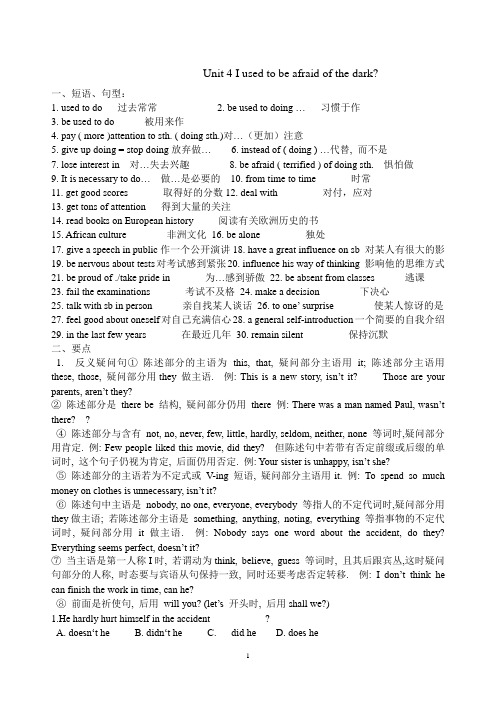
Unit 4 I used to be afraid of the dark?一、短语、句型:1. used to do 过去常常2. be used to doing … 习惯于作3. be used to do 被用来作4. pay ( more )attention to sth. ( doing sth.)对…(更加)注意5. give up doing = stop doing放弃做…6. instead of ( doing ) …代替, 而不是7. lose interest in 对…失去兴趣8. be afraid ( terrified ) of doing sth. 惧怕做9. It is necessary to do… 做…是必要的10. from time to time 时常11. get good scores 取得好的分数12. deal with 对付,应对13. get tons of attention 得到大量的关注14. read books on European history 阅读有关欧洲历史的书15. African culture 非洲文化16. be alone 独处17. give a speech in public作一个公开演讲18. have a great influence on sb 对某人有很大的影19. be nervous about tests对考试感到紧张20. influence his way of thinking 影响他的思维方式21. be proud of ./take pride in 为…感到骄傲22. be absent from classes 逃课23. fail the examinations 考试不及格24. make a decision 下决心25. talk with sb in person 亲自找某人谈话26. to one’ surprise 使某人惊讶的是27. feel good about oneself对自己充满信心28. a general self-introduction一个简要的自我介绍29. in the last few years 在最近几年30. remain silent 保持沉默二、要点1. 反义疑问句①陈述部分的主语为this, that, 疑问部分主语用it; 陈述部分主语用these, those, 疑问部分用they 做主语. 例: This is a new story, isn’t it? Th ose are your parents, aren’t they?②陈述部分是there be 结构, 疑问部分仍用there 例: There was a man named Paul, wasn’t there? ?④陈述部分与含有not, no, never, few, little, hardly, seldom, neither, none 等词时,疑问部分用肯定. 例: Few people liked this movie, did they? 但陈述句中若带有否定前缀或后缀的单词时, 这个句子仍视为肯定, 后面仍用否定. 例: Your sister is unhappy, isn’t she?⑤陈述部分的主语若为不定式或V-ing 短语, 疑问部分主语用it. 例: To spend so much money on clothes is unnecessary, isn’t it?⑥陈述句中主语是nobody, no one, everyone, everybody 等指人的不定代词时,疑问部分用they做主语; 若陈述部分主语是something, anything, noting, everything 等指事物的不定代词时, 疑问部分用it 做主语. 例: Nobody says one word about the accident, do they? Everything seems perfect, doesn’t it?⑦当主语是第一人称I时, 若谓动为think, believe, guess 等词时, 且其后跟宾丛,这时疑问句部分的人称, 时态要与宾语从句保持一致, 同时还要考虑否定转移. 例: I d on’t think he can finish the work in time, can he?⑧前面是祈使句, 后用will you? (let’s 开头时, 后用shall we?)1.He hardly hurt himself in the accident___________?A. doesn‘t heB. didn‘t heC. did heD. does he2.Let‘s search the Internet fo r some information about famous people,______?A. will youB. won‘t youC. shall we3.Eric‘s never seen a three-D movie at the cinema,_______?A.hasn‘t he B.has he C.isn‘t he D.is he4.-He didn‘t go to the meeting this morning, did he? ----______. Though he was not feeling very well. A. No, he didn‘t. B. Ye s, he did. C. No, he did. D. Yes, he didn‘t.5. —He‘s already back to Australia, _________? — _________. He is on a visit to Shanghai.A. isn‘t he; NoB. hasn‘t he; YesC. isn‘t he; YesD. hasn‘t he; No6. —She doesn‘t like geography,does she? —_________.A. Yes,she doesB. Yes,she doesn‘tC. No,she does7. He‘s flown to Hainan for a holiday, _______ he?A. isn‘tB. hasn‘tC. wasn‘t8. ---- Let‘s go skating,_______? --- OK. Let‘s go.A. do youB. don‘t youC. will youD. shall we9. –There is little milk in the milk bag, ________ there?A. isB. isn‘tC. aren‘tD. are10. Bob, you watched the fashion show last night, ________?A. weren‘t youB. didn‘t youC. haven‘t youD. won‘t you2. used to do sth. 过去常常做某事否定形式:didn’t use to do sth. / used not to do sth. 如:He used to play football after school. 放学后他过去常常踢足球。
Unit 4 I used to be afraid of the dark课文重难点讲解与练习
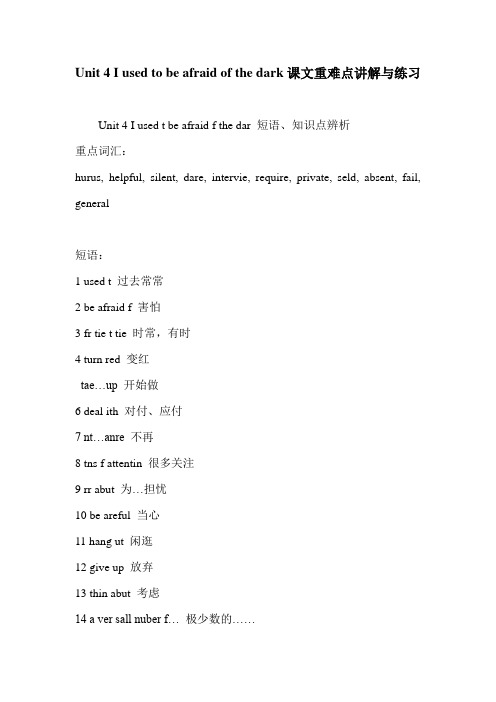
intervie v采访;面试n面试;访谈
面试进行得非常顺利。The __________ent ell
intervie既可作动词,还可作名词。
派生词:intervieern面试者;采访者intervieeen被访问者;被采访者
----i had nthing fr breafast this rning, ______________? -----___________ He gt up t late
A Had he; es B hadn’t he; es did he; N D didn’t he, N
---u didn’t g t shl, did u? ----es, I did / N, I didn’t不,我去了。/是的,我没去。
30 tae pride f为……感到自豪
31 pa attentin t对…注意,留心
32 ne f…… ……之一
33 in the last fe ears在过去的几年里
固定词组:
1 used t d sth过去常常做某事
2 be afraid f ding sth害怕做某事
3 give up ding sth放弃做某事
2 hurus ad有幽默感的;滑稽有趣的。是由hur+us(形容词后缀)构成的派生词。其名词形式:hur幽默;滑稽。
She lies telling es She is a ______________ (hur) persn in ur inds
3 She as alas silent in lass她在堂上总是很沉默。
The are ging t have an ____________ (采访) trr rning
Unit 4 I used to be afraid of the dark课文及详解

Unit 4 I used to be afraid of the dark课文及详解Unit 4 I used t be afraid f the darLanguage Gal:Tal abut hat u used t be lieSetin A1a Fill in the hart ith rds t desribe pepleAppearane 外表Persnalit 个性Tall 高个的utging 外向的straight hair 直发Funn 滑稽的,有趣的ari, u used t be shrt, didn’t u?es, I didused t和uld①used t和uld都可表示过去的习惯或行为,常可换用。
hen e ere hildren e used t/uld g sating ver inter 我们小时候每年冬天都去滑冰。
②used t含有较强的“今昔对比”的含义I d nt si s ften as I used t我不像过去那样常游泳了。
而used t则可无时间状语used t d和be used t ding①be used t 是“习惯于”某一客观事实和状态,不强调动作,t是介词,后面接名词或动名词,I a used t the eather here我已经习惯于这里的天气了。
He is used t hard r 他习惯于艰苦的工作。
②get(或bee)used t指的是从不习惯到习惯这一过程的转变,另外,它往往包含着克服困难去适应的意思。
如:u ill sn get used t the eather here你会习惯于这里的天气的。
In the end, I gt used t ding the hard r最后,我终于习惯干苦活了。
used t d sth 过去常常做某事He used t pla ftball after shl 放学后他过去常常踢足球。
Unit 4 I used to be afraid of the dark
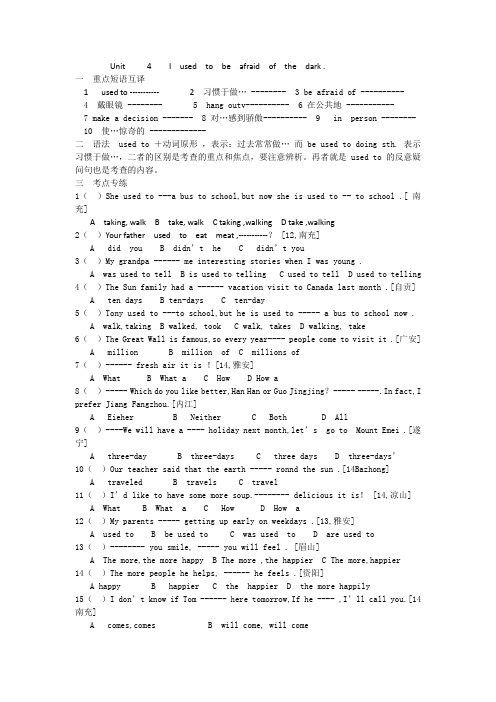
Unit 4 I used to be afraid of the dark .一重点短语互译1 used to -----------2 习惯于做… --------3 be afraid of ----------4 戴眼镜 --------5 hang outv----------6 在公共地 -----------7 make a decision ------- 8 对…感到骄傲---------- 9 in person -------- 10 使…惊奇的 -------------二语法 used to +动词原形,表示:过去常常做…而 be used to doing sth. 表示习惯于做…,二者的区别是考查的重点和焦点,要注意辨析。
再者就是used to 的反意疑问句也是考查的内容。
三考点专练1()She used to ---a bus to school,but now she is used to -- to school .[ 南充]A taking, walkB take, walkC taking ,walkingD take ,walking2()Your father used to eat meat ,-----------? [12,南充]A did youB didn’t heC didn’t you3()My grandpa ------ me interesting stories when I was young .A was used to tellB is used to tellingC used to tellD used to telling 4()The Sun family had a ------ vacation visit to Canada last month .[自贡]A ten daysB ten-daysC ten-day5()Tony used to ---to school,but he is used to ----- a bus to school now .A walk,takingB walked, tookC walk, takesD walking, take6()The Great Wall is famous,so every year---- people come to visit it .[广安]A millionB million ofC millions of7()------ fresh air it is ![14,雅安]A WhatB What aC HowD How a8()----- Which do you like better,Han Han or Guo Jingjing?----- -----.In fact,I prefer Jiang Fangzhou.[内江]A EieherB NeitherC BothD All9()----We will have a ---- holiday next month,let’s go to Mount Emei .[遂宁]A three-dayB three-daysC three daysD three-days’10()Our teacher said that the earth ----- ronnd the sun .[14Bazhong]A traveledB travelsC travel11()I’d like to have some more soup.-------- delicious it is! [14,凉山]A WhatB What aC HowD How a12()My parents ----- getting up early on weekdays .[13,雅安]A used toB be used toC was used toD are used to13()-------- you smile, ----- you will feel . [眉山]A The more,the more happyB The more ,the happierC The more,happier14()The more people he helps, ------ he feels .[资阳]A happyB happierC the happierD the more happily15()I don’t know if Tom ------ here tomorrow,If he ---- ,I’ll call you.[14南充]A comes,comesB will come, will comeC comes,will comeD will come ,comes16 ()Wang Mei used to ------- glasses .A wearingB wearC put onD putting on17 ()My sister in interested in -------- the guitar .A playingB playC to playD played18 ()Tina used to be shy ,but now she is ------ .A activeB quiteC outgoingD short19 () -------- big and strong he is now!A HowB WhatC What aD How a20 ()My brother is ----- in English ,he thinks English is very ------ .A interested;interestedB interested;interestingC interesting; interestingD interesting; interested21() There is nothing wrong with your mother,please don’t ----- her .A take pride inB pay attention toC worry aboutD listen to22() He used to --- late .But now he is used to ------ early .A sleep;get upB sleep;getting upC sleeping;get upD sleeping;getting up23 ()She -------- watch a lot of movies.A usedn’t toB didn’t use toC didn’t used toD didn’t used24 ()I used to be ---- about tests all the time,and I couldn’t sleep .A relaxedB excitedC nervousD happy25 ()Don’t worry .She is ------- to take care of little David .A carefully enoughB enough carefullyC careful enoughD enough careful26 ()The old man is -----,but he doesn’t feel ------- .A lonely;aloneB lonely;lonelyC alone;lonelyD alone;alone27 ()Tony used to --- to school,but he is used to --- to school now .A walk;taking a busB walked;took a busC walk;take a busD walking;take a bus28 ()Every year driving after drinking wine ----- a lot of traffic accidents.A happensB providesC causesD has29 () Our hometown --------- a lot in the last few years .A has changedB have changedC will changeD changed30 ()Excuse me. Could you please tell me -----------?A where can I buy the MP4B I can buy the MP4 whereC where I can buy the MP4D what can I buy三句型转换。
Unit 4I used to be afraid of the dark
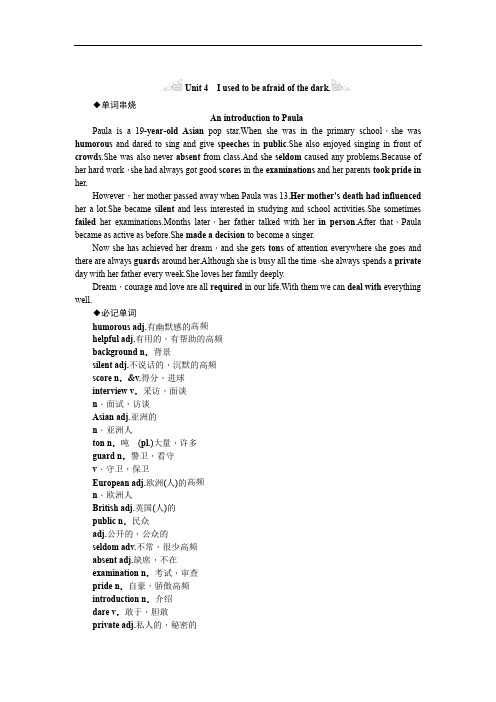
Unit 4I used to be afraid of the dark.◆单词串烧An introduction to PaulaPaula is a 19-year-old Asian pop star.When she was in the primary school,she was humorous and dared to sing and give speeches in public.She also enjoyed singing in front of crowds.She was also never absent from class.And she seldom caused any problems.Because of her hard work,she had always got good scores in the examinations and her parents took pride in her.However,her mother passed away when Paula was 13.Her mother's death had influenced her a lot.She became silent and less interested in studying and school activities.She sometimes failed her examinations.Months later,her father talked with her in person.After that,Paula became as active as before.She made a decision to become a singer.Now she has achieved her dream,and she gets tons of attention everywhere she goes and there are always guards around her.Although she is busy all the time,she always spends a private day with her father every week.She loves her family deeply.Dream,courage and love are all required in our life.With them we can deal with everything well.◆必记单词humorous adj.有幽默感的高频helpful adj.有用的,有帮助的高频background n.背景silent adj.不说话的,沉默的高频score n.&v.得分,进球interview v.采访,面谈n.面试,访谈Asian adj.亚洲的n.亚洲人ton n.吨(pl.)大量,许多guard n.警卫,看守v.守卫,保卫European adj.欧洲(人)的高频n.欧洲人British adj.英国(人)的public n.民众adj.公开的,公众的seldom adv.不常,很少高频absent adj.缺席,不在examination n.考试,审查pride n.自豪,骄傲高频introduction n.介绍dare v.敢于,胆敢private adj.私人的,秘密的require v.需要,要求African adj.非洲(人)的n.非洲人speech n.讲话,发言ant n.蚂蚁influence v.&n.影响fail v.不及格,失败,未能(做到)高频exactly adv.确切地,精确地general adj.总的,普遍的n.将军◆重点短语from time to time时常,有时高频deal with对待,对付高频take pride in为……感到自豪高频take up开始从事(某事)高频tons of许多,大量be absent from缺席even though即使高频be afraid of害怕in public公开地高频in person亲身,亲自高频be proud of为……骄傲高频all the time总是,一直hang out闲逛make a decision做决定高频used to过去常常◆词形变换humorous adj.→humor n.幽默高频helpful adj.→help v. & n.帮助,帮忙silent adj.→silence n.沉默高频Asian adj. & n.→Asia n.亚洲高频European adj. & n.→Europe n.欧洲高频African adj. & n.→Africa n.非洲高频British adj. & n.→Britain n.英国absent adj.→absence n.缺席exactly ad v.→exact adj.精确的pride n.→proud adj.骄傲的,自豪的高频introduction n.→introduce v.介绍◆重点句子1.She was never brave enough to ask questions.她从来不够勇敢地去问问题。
Unit 4 I used to be afraid of the dark(人教版)
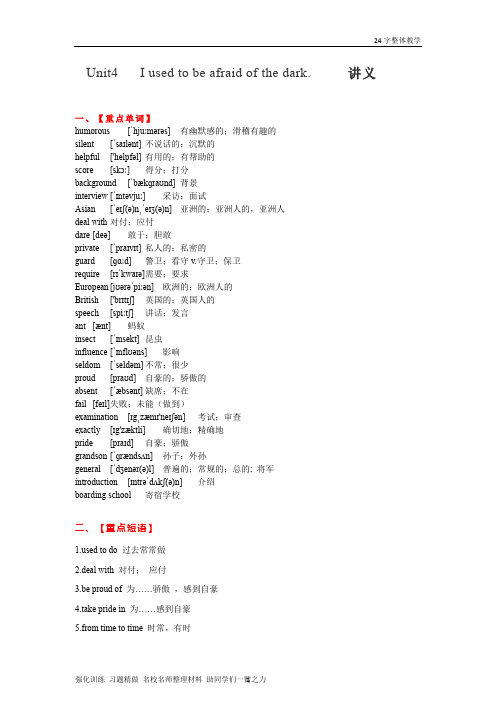
Unit4 I used to be afraid of the dark.讲义一、【重点单词】humorous[ˈhjuːmərəs]有幽默感的;滑稽有趣的silent[ˈsaɪlənt]不说话的;沉默的helpful['helpfəl]有用的;有帮助的score[skɔː]得分;打分background[ˈbækɡraʊnd]背景interview[ˈɪntəvjuː]采访;面试Asian[ˈeɪʃ(ə)nˌˈeɪʒ(ə)n]亚洲的;亚洲人的,亚洲人deal with对付;应付dare[deə]敢于;胆敢private[ˈpraɪvɪt]私人的;私密的guard[ɡɑːd]警卫;看守v.守卫;保卫require[rɪˈkwaɪə]需要;要求European[jʊərəˈpiːən]欧洲的;欧洲人的British['brɪtɪʃ]英国的;英国人的speech[spiːtʃ]讲话;发言ant[ænt]蚂蚁insect[ˈɪnsekt]昆虫influence[ˈɪnflʊəns]影响seldom[ˈseldəm]不常;很少proud[praʊd]自豪的;骄傲的absent[ˈæbsənt]缺席;不在fail[feɪl]失败;未能(做到)examination[ɪgˌzæmɪ'neɪʃən]考试;审查exactly[ɪg'zæktli]确切地;精确地pride[praɪd]自豪;骄傲grandson[ˈɡrændsʌn]孙子;外孙general[ˈdʒenər(ə)l]普遍的;常规的;总的; 将军introduction[ɪntrəˈdʌkʃ(ə)n]介绍boarding school寄宿学校二、【重点短语】ed to do 过去常常做2.deal with 对付;应付3.be proud of 为……骄傲,感到自豪4.take pride in 为……感到自豪5.from time to time 时常,有时6.in public 公开地7.in person 亲身,亲自8.take up sth 开始做,接受,占用9.not…anymore 不再10.worry about 为……担忧11.hang out 闲逛12.think about 考虑13.be alone 独处14.on the soccer team 在足球队15.no longer 不再16.make a decision 做决定17.to one’s surprise 令某人吃惊的是18.even though 尽管19.pay attention to 对……注意,留心20.in the last few years 在过去的几年里21.be afraid of 害怕22.turn red 变红23.get tons of attention 被众人所关注;吸引无数目光24.be careful 当心25.give up 放弃26.a very small number of …极少数的……27.give a speech 作演讲28.all the time 一直总是29.be interested in 对……感兴趣30.change one’s life 改变某人的生活31.take care of 照顾32.be able to do sth. 能够,有能力做某事33.g e t g o o d s c o r e s取得好成绩34.be absent from缺席35.i t’s h a r d t o b e l i e v e t h a t...很难相信……36.建议某人做某事 a d v i s e s b t o d o s t h三、【重点句型】1. I used to be afraid of the dark.我过去常常害怕黑暗。
Unit 4 I used to be afraid of the Dark单元知识盘点

单元知识盘点
常用短语
used to 过去常常;以前经常 be afraid of 害怕 be interested in 对……感兴趣 from time to time 时常;有时 see sb. doing sth. 看到某人正在做某事 take up 开始从事 deal with 应对;处理
谢 谢 观 看!
本课件仅供交流学习使用,严禁用于任何商业用途
全品大讲堂
英语
九年级全一册(上)
新课标(RJ)
Unit 4 I used to be afraid of the Dark.
单元知识盘点
Unit 4 I used to be afraid of the Dark.
单元知识盘点
常用短语 经典句型 语法点睛 课文再现
What makes the problem boy change?
Before talking
He felt 1. lonely and unhappy
He was 2.
absent
He 3.
failed
. from classes. his examinations.
单元知识盘点
After talking
He has become more outgoing.
He has made 4. some good friends in school.
He studies harder than 5.
he used to
.
Model Li Wen used to be a problem boy, but now he has changed a lot. Before talking with his parents, he used to…After talking with his parents, he…
- 1、下载文档前请自行甄别文档内容的完整性,平台不提供额外的编辑、内容补充、找答案等附加服务。
- 2、"仅部分预览"的文档,不可在线预览部分如存在完整性等问题,可反馈申请退款(可完整预览的文档不适用该条件!)。
- 3、如文档侵犯您的权益,请联系客服反馈,我们会尽快为您处理(人工客服工作时间:9:00-18:30)。
5) Teaching by pairwork and groupwork 4) “Task-based” teaching method
1) Five-step teaching method
(1) Cooperative learning s strategy (2) Discovery learning strategy
2.Learning strategies
(3) Inductive learning strategy
Step One: Lead in Step Two: Presentation Step Three: Practice Step Four: Brief summary
Step Five:Presentation and Drill
Activity 1.What did he use to look like?
He used to be short. He used to be shy. He used to have short hair.
Step 2: Presentation: Activity 2:
Why points and difficult points 6.Teaching procedures 7.Blackboard Design
This is the first period of the unit. According to compare the changes of past to now ,students can use “used to” to describe the changes .
+3 +2
+1
Step 9:Homework Talk about the great changes in your hometown.
Thanks for listening !
no.2 no.7 no.1 no.3 no.4 no.5
no.6
no.8
连词成句:
used, be, I, to, short I used to be short.
1. Eric 以前很矮。 used ___ to be short Eric _____
+2
Linda 以前很喜欢弹钢琴。
Linda used to like playing the piano.
翻译:
他以前不喜欢弹钢琴。 didn’t ______ use to like ______ playing He ______ the piano.
B
didn’t ______? he He used to be short ,_____
Step One: Lead-in
What does YaoMing look like?
He’s tall. He’s strong. He’s serious. He has short black hair. He likes playing basketball.
Step 2: Presentation:
Check the phrases or words on the small blackboards. Compare which group did the best.
A +3
B +2
C +1
Activity 3:
wear glasses outgoing
shy
Short hair
funny
Q3:Angela use to have curly hair, didn’t she? No,she didn’t,.She didn’t use to have curly hair. She used to have straight hair.
Step 5:Presentation and Drill
(在30秒内画一张 你5岁时的样子, 画在小黑板上)
Step 8: Writing practice:
Writing:
YuMei has changed a lot. She used to_____
Step 8: Writing practice:
Yu Mei has changed a lot : She used to be short, but now she is tall. She used to have long hair, now she has short hair. She used to be shy, but she is outgoing now. She used to like playing football, she likes playing tennis now.
Step 5:Presentation and Drill
Activity 1:
Q1:Did Li Xiang use to wear glasses? Yes, she did . She used to wear glasses. Q2: Did she use to be shy? No, she didn’t. she used to be outgoing.
He used to wear _______ glasses .
2. Amy used to be______ tall .
She used to have __________. short hair 3. Tina used to have ____ red and _____hair. curly
Activity 2: Groupwork:
Talk about your family members
A:Did your grandfather use to have white hair? B:No, he didn’t. he used to have black hair. A: He used to be old, didn’t he? B:No,he didn’t. He used to be young.
1.Important points: To help students learn and grasp the key vocabularies and the target languages.
1 Teaching strategies
2) Communicative teaching method 3) Audio-visual teaching method
Unit 4 I used to be afraid of the dark (SetionA period 1)
No.6
Centents
2.Analysis of the Students 1.Analysis of the Teaching Material
3.Teaching aims
5.Teaching and learning strategies
The students can describe people’s appearance and personalities. They are interested in talking about the changes.
Knowledge goal: used to , tall. outgoing, wear glasses, have curly hair
What did you use to look like?
I used to be
I used to
short shy play football friendly have short hair wear glasses like playing tennis
used to +v.
used to + be +adj.
Step Six: Listening Practice Step Seven: Game Step Eight:Writing Practice Step Nine : Summarize and Homework
Part 6 Teaching procedures:
Step One : Lead-in 3 minutes before class: Guess: Who is he?
thin curly hair wear glasses
serious shy
quiet friendly funny
Activity 4 :
Brain Storm
1.高________
7.长发__________
2.矮______
3.胖______ 4.瘦_____ 5.外向__________ 6.内向__________
Target Language I used to be short. I didn’t use to have curly hair…
Ability goal: Improve the students’ listening, speaking, reading and writing skills.
Moral goal: To have good Personalities and respect the old and cherish the young
Part 4:Teaching important points and difficult points
2.Difficult points: To talk about people what they used to like.
Step 5:Presentation and Drill
Activity 3
You need to know more.
